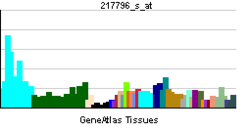- NPLOC4
-
Nuclear protein localization protein 4 homolog is a protein that in humans is encoded by the NPLOC4 gene.[1][2][3]
Interactions
NPLOC4 has been shown to interact with UFD1L.[1][4]
References
- ^ a b Botta A, Tandoi C, Fini G, Calabrese G, Dallapiccola B, Novelli G (Sep 2001). "Cloning and characterization of the gene encoding human NPL4, a protein interacting with the ubiquitin fusion-degradation protein (UFD1L)". Gene 275 (1): 39–46. doi:10.1016/S0378-1119(01)00649-7. PMID 11574150.
- ^ Meyer HH, Shorter JG, Seemann J, Pappin D, Warren G (Jun 2000). "A complex of mammalian Ufd1 and Npl4 links the AAA-ATPase, p97, to ubiquitin and nuclear transport pathways". EMBO J 19 (10): 2181–92. doi:10.1093/emboj/19.10.2181. PMC 384367. PMID 10811609. http://www.pubmedcentral.nih.gov/articlerender.fcgi?tool=pmcentrez&artid=384367.
- ^ "Entrez Gene: NPLOC4 nuclear protein localization 4 homolog (S. cerevisiae)". http://www.ncbi.nlm.nih.gov/sites/entrez?Db=gene&Cmd=ShowDetailView&TermToSearch=55666.
- ^ Lass, Agnieszka; McConnell Elizabeth, Fleck Krista, Palamarchuk Alla, Wójcik Cezary (Aug. 2008). "Analysis of Npl4 deletion mutants in mammalian cells unravels new Ufd1-interacting motifs and suggests a regulatory role of Npl4 in ERAD". Exp. Cell Res. (United States) 314 (14): 2715–23. doi:10.1016/j.yexcr.2008.06.008. PMID 18586029.
Further reading
- McConnell E, Lass A, Wójcik C (2007). "Ufd1-Npl4 is a negative regulator of cholera toxin retrotranslocation". Biochem. Biophys. Res. Commun. 355 (4): 1087–90. doi:10.1016/j.bbrc.2007.02.077. PMID 17331469.
- Gerhard DS, Wagner L, Feingold EA et al. (2004). "The Status, Quality, and Expansion of the NIH Full-Length cDNA Project: The Mammalian Gene Collection (MGC)". Genome Res. 14 (10B): 2121–7. doi:10.1101/gr.2596504. PMC 528928. PMID 15489334. http://www.pubmedcentral.nih.gov/articlerender.fcgi?tool=pmcentrez&artid=528928.
- Ota T, Suzuki Y, Nishikawa T et al. (2004). "Complete sequencing and characterization of 21,243 full-length human cDNAs". Nat. Genet. 36 (1): 40–5. doi:10.1038/ng1285. PMID 14702039.
- Gevaert K, Goethals M, Martens L et al. (2004). "Exploring proteomes and analyzing protein processing by mass spectrometric identification of sorted N-terminal peptides". Nat. Biotechnol. 21 (5): 566–9. doi:10.1038/nbt810. PMID 12665801.
- Strausberg RL, Feingold EA, Grouse LH et al. (2003). "Generation and initial analysis of more than 15,000 full-length human and mouse cDNA sequences". Proc. Natl. Acad. Sci. U.S.A. 99 (26): 16899–903. doi:10.1073/pnas.242603899. PMC 139241. PMID 12477932. http://www.pubmedcentral.nih.gov/articlerender.fcgi?tool=pmcentrez&artid=139241.
- Nagase T, Kikuno R, Ishikawa K et al. (2000). "Prediction of the coding sequences of unidentified human genes. XVII. The complete sequences of 100 new cDNA clones from brain which code for large proteins in vitro". DNA Res. 7 (2): 143–50. doi:10.1093/dnares/7.2.143. PMID 10819331.
PDB gallery Categories:- Human proteins
- Chromosome 17 gene stubs
Wikimedia Foundation. 2010.





